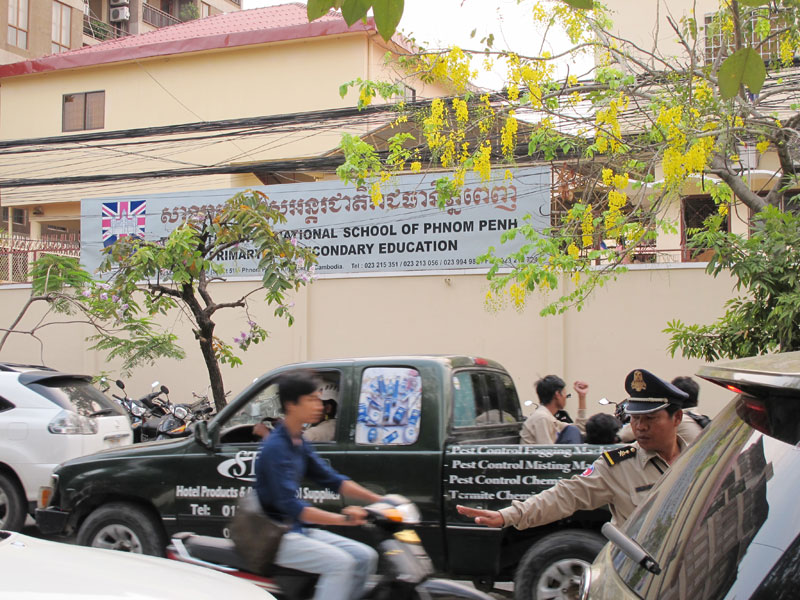Twice a day, traffic officer Troeung Sophoan takes his place at the intersection of Pasteur Street and Street 306 and braces for the predictable: a traffic jam as parents pick up their children from the British International School of Phnom Penh.
“Some other schools have traffic jams, but not like this school,” said Mr. Sophoan, a commune officer in Boeng Keng Kang I, the neighborhood most favored by expats.

Traffic jams follow a daily rhythm: first at 11:30 a.m., when the school lets out for lunch, and again at the end of the school day—4 p.m.—for children younger than age 10, and 5 p.m. for older students.
Across the city, similar jams occur around private schools where children are often chauffeured home in their parent’s cars and SUVs, said Kul Sophat, Boeng Keng Kang I commune police chief.
Administrators at the French school, Lycee Francais Rene Descartes, in Daun Penh district’s Wat Phnom commune, have three district police officers to direct traffic near the school. The school asks parents to park further away and walk to pick up their children.
“It is difficult to maintain,” said Christian Malovry, primary school director at the school. “We try our best.”
Ling Peoh, an administrator for the British International School in Phnom Penh, said she doesn’t believe her school is worse than any other.
“If you look around town, you can see traffic everywhere,” she said. “We do what we have to do, just like anywhere else.”
But wide streets with well-marked lanes border the Lycée Francais Rene Descartes and the International School of Phnom Penh. The British International School of Phnom Penh is on a narrower road. Once Pasteur clogs, congestion spreads to adjacent roads, causing the worst jam in town, said Mr. Sophat.
Half an hour before the school recess bell rings, Pasteur and connecting streets are already lined with cars. Some belong to patrons of Brown Coffee or Burger King. Some belong to parents like Sovatana Yong, who try to beat the rush.
Across from the school, Mr. Yong waits in his car with his wife for their 9-year-old son, Harry. Every day, the couple arrive by 3:30 p.m. to secure a curbside parking spot. Even these early birds sometimes have to park a few blocks away.
Mr. Yong could arrive at 4 p.m. and spend 15 minutes in traffic, but then he’d be late to pick up his son.
“I don’t want my son to wait for me,” he said. “Every day I come early for him.”
Other parents say they spend 15 to 20 minutes in traffic before getting their child. Mr. Yong noted that he often sees parents double parking—stopping their cars next to already parked cars. This reduces the two-way street to a single lane of slow moving traffic.
“I always ask staff of this school to tell all parents that when picking up their kids they should park so not to cause a traffic jam,” said Mr. Sophat. “Some people do not listen.”
Sure enough, at 4 p.m. a blue car pulls up to the school and stops next to a car already parked at the curb. Immediately, five other cars and several motorbike drivers slow to a halt.
It happens every day, said Chhum Chhorn, a tuk-tuk driver who waits by the corner near the school because of the businesses across the street. At the height of traffic, he turns down calls from customers because he can’t move his tuk-tuk into the road.
Calls to the Department of Public Works and Transportation were not returned on Friday, and City hall spokesman Long Dimanche could not be reached.
Down on the street, officer Sophoan said that despite his shouts and whistle-blowing, drivers often don’t listen to him. Motorbike drivers sometimes ride in the oncoming traffic lane, slowing cars up the road.
And, inevitably, the logistics of the road—a small street and a rush of parents—creates at least one small backup daily.
“This street is not big, it’s too small,” Mr. Sophoan said, “I try to get people to move a little bit.”